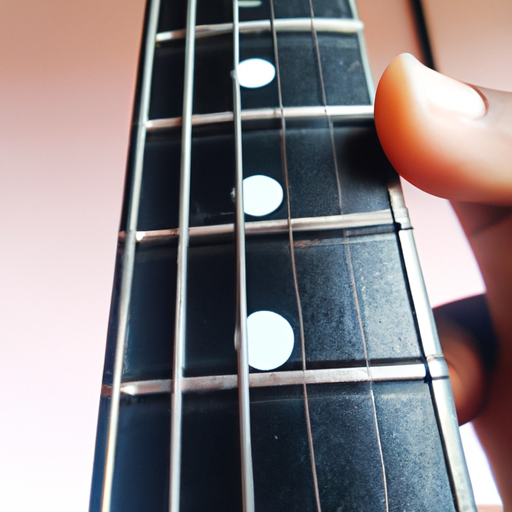
If you're a beginner guitarist, one of the most important things you need to have in your toolkit is a guitar pick. But with so many types, shapes, and materials to choose from, it can be overwhelming to know where to start. In this article, we'll break down the different types of guitar picks and help you choose the best one for your playing style and skill level.

While some guitarists prefer to play with their fingers, using a guitar pick can help you achieve a cleaner, more consistent sound. It also allows you to play faster and with greater precision, making it an essential tool for beginner guitarists who are still developing their technique.

There are several types of guitar picks available, each with its own unique shape, material, and thickness. In the following sections, we'll explore these different types and help you choose the best one for your needs.
The most common type of guitar pick is the standard pick, which is a small, triangular-shaped piece of plastic or nylon. These picks are versatile and can be used for a wide range of playing styles and genres.
Triangle picks are similar to standard picks, but with a more angular shape. They offer a slightly different attack and can be a good choice for guitarists who prefer a harder, sharper sound.
Jazz picks are smaller and more refined than standard picks, with a pointed tip that allows for greater precision and control. They are often used for jazz and other genres that require intricate, fast-paced playing.
Thumb picks are unique in that they attach to the thumb instead of being held between the fingers. They can be a good choice for guitarists who want to achieve a fingerpicking style while still using a pick for greater volume and attack.
Similar to thumb picks, finger picks attach to the fingers and can be used for fingerstyle playing. They offer greater precision and control than playing with just the fingers, but can take some time to get used to.
Plastic picks are the most common type of pick and are affordable and durable. They come in a variety of thicknesses and can be used for many different playing styles.
Nylon picks are smoother than plastic picks and can produce a warmer, more mellow tone. They are often used for acoustic playing and strumming.
Celluloid picks were popular in the early days of guitar playing and are still used by many guitarists today. They have a warm, mellow tone and come in a variety of colors and designs.
Metal picks are much less common than plastic or nylon picks, but can produce a unique, edgy sound. They are often used for heavy metal and hard rock playing.
Wooden picks are a less common choice, but can produce a warm, natural sound. They are often used for acoustic playing and fingerpicking.
Thin picks are often used for strumming and producing a softer, more mellow tone. They are a good choice for beginners who are still developing their technique.
Medium picks are a versatile choice and can be used for a wide range of playing styles and genres. They offer a balance of flexibility and attack.
Thick picks are often used for heavy strumming and lead playing. They produce a sharp attack and are a good choice for guitarists who want more power and control.
Round picks offer a smooth attack and are often used for strumming and producing a softer, more mellow tone.
Pointed picks offer a sharper attack and are a good choice for lead playing and producing a more edgy sound.
Teardrop picks are a versatile choice and can be used for a wide range of playing styles. They offer a balance of attack and flexibility.
If you're a beginner guitarist, it's important to choose a pick that is easy to hold and allows you to develop your technique. Thin or medium picks are a good choice, as they offer greater flexibility and are easier to control.
Your playing style will also play a role in choosing the best guitar pick for you. If you prefer a softer, more mellow sound, a nylon or wooden pick may be a good choice. If you prefer a sharper attack and edgier sound, a plastic or metal pick may be a better choice.
The type of guitar you play can also influence your pick choice. Acoustic guitars may benefit from a softer, more mellow pick, while electric guitars may require a pick with more attack and control.
The genre of music you play will also influence your pick choice. Jazz guitarists may prefer a small, pointed pick for greater precision, while heavy metal guitarists may prefer a thick, metal pick for greater power and control.
Hold the pick between your thumb and index finger with a loose grip. This will allow for greater flexibility and control.
The angle at which you hold the pick can also influence your sound. Experiment with different angles to find the one that produces the sound you're looking for.
Learning different strumming techniques can also help you achieve a wider range of sounds and tones with your guitar pick.
Gripping the pick too tightly can limit your flexibility and control. Try to hold the pick with a loose grip to achieve a wider range of sounds.
Make sure you're holding the pick correctly, with the pointed end facing downward. Holding the pick upside down can limit your playing ability.
Over time, picks can become worn and damaged, which can affect your sound quality. Make sure to replace your picks regularly to achieve the best possible sound.
To clean your guitar picks, simply wipe them down with a soft cloth or rinse them in warm water and mild soap. Avoid using harsh chemicals or abrasive materials, as this can damage the picks.
Store your picks in a dry, cool place to avoid warping or damage. Consider using a pick holder or case for easier organization.
Replace your picks when they become worn or damaged, or when you want to experiment with a different type or thickness.
There are many different types of guitar picks available, each with its own unique shape, material, and thickness. Standard picks, triangle picks, jazz picks, thumb picks, and finger picks are all popular choices, as are plastic, nylon, celluloid, metal, and wooden picks.
As a beginner guitarist, it's important to choose a pick that is easy to hold and allows you to develop your technique. Experiment with different types, shapes, and materials to find the one that works best for you. And remember to clean and replace your picks regularly to achieve the best possible sound.
If you're looking for high-quality guitar picks, check out https://chothuebannhac.net/cho-thue-ban-nhac/luom-lat-tin-do-day/. They offer a wide range of picks in different materials and thicknesses to suit all playing styles and skill levels.